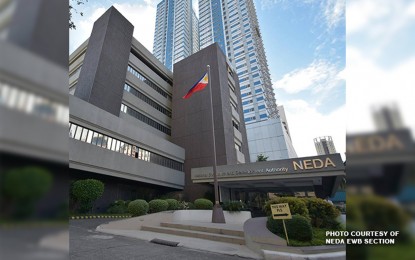
MANILA – The Duterte administration accomplished several reforms that took decades to be enacted that helped the country attain its lowest poverty rate in 2018 and will pave the way for the achievement of its 2040 vision, the National Economic and Development Authority (NEDA) said.
In his presentation during the Talk to the People of President Rodrigo Roa Duterte that aired Wednesday, Socioeconomic Planning Secretary Karl Kendrick Chua highlighted five of NEDA’s top contributions since 2016 to help provide a better life for all Filipinos.
These are strong economic management, the Philippine Identification System (PhilSys) or national ID program, the Rice Tariffication Law (RTL), the infrastructure program, and the Ease of Doing Business Law.
The NEDA chief said that in the first four years of the administration, the Philippines recorded a strong economic growth performance averaging 6.6 percent from 2016 to 2019, the lowest unemployment (5.3 percent), and underemployment (14.8 percent) rates in January 2020.
In addition, Chua said that in 2018, the Philippines recorded the lowest poverty rate (16.7 percent) in the country’s history.
“Ang ating pangako na maiangat ang anim na milyong Pilipino mula sa kahirapan ay nakamit po natin noong 2018, four years ahead of our schedule. Kasi ang una pong naisip po natin ay maaabot yan sa 2022. Pero dahil po sa mga reporma natin, four years ahead of schedule po tayo. (Our promise of lifting 6 million Filipinos out of poverty was achieved in 2018, four years ahead of schedule. We initially targeted to achieve this by 2022, but due to our country’s commitment to push for the needed reforms, we achieved this four years ahead of schedule),” Chua said.
Among these reforms are the national ID program and the RTL.
The national ID program was first attempted in 1973 and was finally enacted 45 years later in August 2018.
It provides all Filipinos with a unique proof of identity to facilitate financial inclusion and the more efficient provision of key services.
As of Sept. 3, 2021, 41.9 million Filipinos have registered for step 1 or the demographic data collection.
Of this, 28.6 million have registered for step 2 or the biometrics capture and 5.2 million individuals have applied for a bank account, while 1.5 million Filipinos have already received their identification cards or PhilID.
The national ID may also be used in the coronavirus disease 2019 (Covid-19) vaccine rollout and distribution of emergency subsidies.
Signed into law by President Rodrigo R. Duterte in August 2018, Republic Act 11055, or the Philippine Identification System Act, aims to establish a single national ID for all Filipinos and resident aliens.
The national ID shall be a valid proof of identity that shall be a means of simplifying public and private transactions, enrollment in schools, and the opening of bank accounts.
It also seeks to boost efficiency, especially in dealing with government services where people will only need to present one ID during transactions.
The RTL was only legislated in 2019 or 32 years later since it was first attempted in 1987. The reform helped lower rice prices due to more open importation and increased farmer productivity due to the Rice Competitiveness Enhancement Fund.
“From a peak of 45 pesos per kilo bago po maipasa ang RTL, naibaba po natin ito hanggang 37 pesos per kilo. At tuloy-tuloy po, nakikita namin, ang potensyal ng pagbaba ng presyo ng bigas para matulungan ang bawat Pilipino. (From a peak of 45 pesos per kilo before RTL, we were able to lower rice prices to as low as 37 pesos per kilo. We see the potential of continuous lowering of rice prices to help every Filipino),” Chua said.
Moreover, under the Duterte administration, infrastructure spending tripled and created millions of jobs, contributing to the lowest unemployment and poverty rates before the pandemic.
During the administration, the NEDA Investment Coordination Committee approved 79 major infrastructure projects amounting to PHP3.9 trillion.
These projects are expected to generate 6 million jobs over the construction period and reduce the Filipinos’ travel time, by 41 percent, and transport costs, by PHP43 billion annually.
Meanwhile, with the implementation of the Ease of Doing Business and Efficient Government Service Delivery Act of 2018, the Philippines’ global ranking in ease of doing business improved by 29 notches from 2019 to 2020, the largest improvement in recent history.
Chua said attaining the country’s economic growth targets in 2021 and 2022 remains encouraging and NEDA will continue to pursue economic reforms to attract more investments and create more and better jobs.
"Mayroon po tayong natitirang economic reforms na na-certify niyo na po as urgent. Ito po ang mga Public Service Act, Retail Trade Liberalization Act, at Foreign Investment Act. At ang layunin nito ay maka-attract po tayo ng mas maraming investment. Para sa mga ordinaryong Pilipino, ito po ‘yong paglikha po natin ng mas marami at mas mabuting trabaho. (We have remaining reforms that have been certified as urgent. These are the amendments to the Public Service Act, Retail Trade Liberalization Act, and Foreign Investment Act, which aim to attract more investments. For ordinary Filipinos, this means creating more and better jobs),” Chua said.
These reforms are included in the Updated Philippine Development Plan 2017-2022 anchored on the 0-10 point Socioeconomic Agenda and is geared towards achieving the Ambisyon Natin 2040 or the collective long-term vision of the country. (PR)
